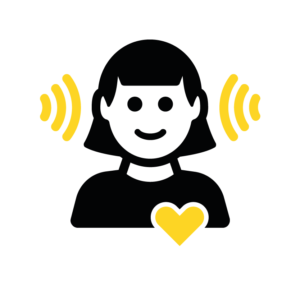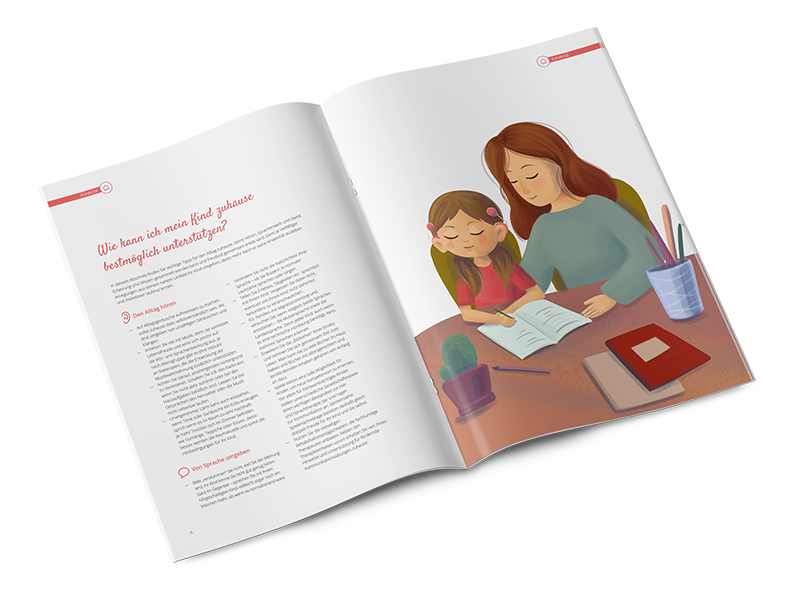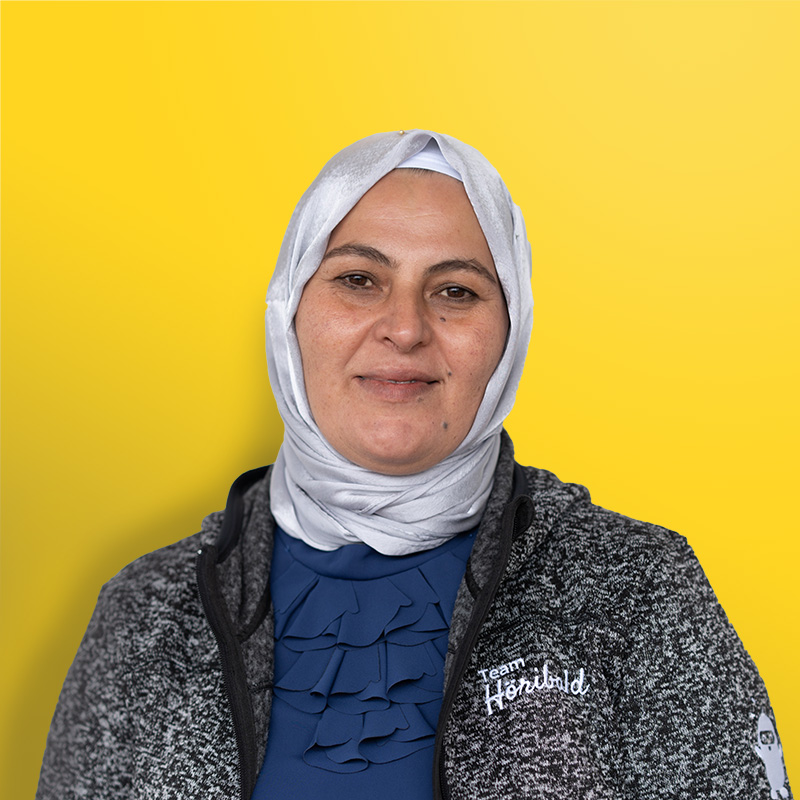Education


Education
All about development and learning with hearing impairment
A child learns language as it gathers life experience and expands its knowledge of the world. This happens in the first years of life in a protected family environment, then in kindergarten and until they reach the age of majority in school and education.
The effectiveness of language learning therefore depends to a large extent on the framework conditions provided by adults. Language acquisition and thus the acquisition of experience and knowledge will be all the more successful if your child can live out its creativity and everything that makes it human through a wide range of stimuli from its immediate environment.
If learning language is difficult for your child due to a hearing impairment or even deafness, the support provided by you as parents and in educational institutions is of enormous importance in addition to medical and technical care.
Here you will find valuable tips on how you can provide your child with optimum language support at home and what you need to bear in mind when choosing an educational establishment!
Table of contents
I believe that the goal of
education needs to be love.
Astrid Lindgren
Checklist for everyday life in the family
Discover hearing
 Draw your child's attention to any sounds you hear. Try to describe them. Whether at home, in the zoo or at the playground - we are surrounded by countless noises and sounds.
Draw your child's attention to any sounds you hear. Try to describe them. Whether at home, in the zoo or at the playground - we are surrounded by countless noises and sounds.- Work a lot with music, as it conveys joy and has a positive effect on hearing as well as speech development. Depending on the age group, there are a variety of materials that additionally support the development of music perception.
- If your child repeatedly refuses to wear the audio processor, there may be reasons for this that you should be aware of or that can be resolved quickly: During fitting appointments, for example, make sure that your child finds the current setting comfortable. The magnet on the audio processor may also be too strong and create an uncomfortable pressure point. Children often feel the pressure from their parents to succeed or, conversely, use rejection as a means of putting pressure on their parents. In any case, the bottom line is that if the audio processor is properly adjusted and the right conditions are in place, your child will definitely recognize the benefits of the new hearing aid.
Surrounded by sounds
 Please don't "fall silent" because you think your child can't hear you well enough. On the contrary - talk to your hearing-impaired child, perhaps even a little more than you would if they had normal hearing.
Please don't "fall silent" because you think your child can't hear you well enough. On the contrary - talk to your hearing-impaired child, perhaps even a little more than you would if they had normal hearing.- Don't change the naturalness of your speech - whether you whisper, speak at a normal volume or sing.
- Conversely, pay attention to all sounds and linguistic utterances that your child makes. They should understand the effect of their language as a means of communication.
- Share experiences, activities, etc. with your child verbally. Don't forget to illustrate things that your child may not have heard.
- For families with a migration background: if possible, try to offer both languages - the mother tongue and the national language. Every child, even if they need a technical hearing solution, is capable of learning several languages.
- Keep a record of your child's experiences in a diary that you can refer to at any time. With pictures, drawings and even writing, your child can show their diary to someone else and use it to recount their experiences, even if their speech may still be a little behind due to their hearing impairment. Apart from that, the diary will later be a wonderful reminder of childhood.
- Play role-playing games with your child! Among other things, this promotes their ability to empathize with other people. He or she plays "into the world of the other person", so to speak, and sees and feels the world with different eyes.
- Expand your child's "library" and take time to read (aloud) together. You can never have too many books in the house and books with age-appropriate and learning-promoting content should be included right from the start.
- Sing in front of your child as often as you can! And don't be too surprised if your child tries to imitate you one day. This could be one of the great moments in the early years of hearing.
Virtual learning
Online lessons can be used as early as elementary school if required. An optimal environment at home and safe handling of the technology will enable your child to participate smoothly in this modern form of teaching. With the following tips, you can help your child achieve better learning success:
- If possible, create a quiet area at home for your child to study.
- Separate this from the play area or clear it of play materials before the lesson begins.
- For a good online connection, it is advisable to be close to the WLAN router.
- During lessons, the other family members should reduce the Internet to avoid connection problems.
- The screen should be as large as possible, so use a PC, laptop or tablet and avoid cell phones.
- Find out what technical options your child's audio processors offer to couple the computer's audio output as directly as possible into the hearing system: depending on the audio processor, audio cables, induction loops or AudioLink can lead to significantly improved sound quality and therefore more relaxed listening and better understanding.
- Help your child to familiarize themselves with the technical possibilities of the online platform used by the school, e.g:
- Where can you enlarge the picture of the teacher so that the mouth image is clearly visible?
- Is there a "Subtitles" function?
Necessary checks
 Check that your child's hearing system is working properly every day, as they may not be able to alert you to a defect in time.
Check that your child's hearing system is working properly every day, as they may not be able to alert you to a defect in time.- Have your child's hearing performance checked regularly by means of a hearing test - usually at the speech therapy appointment.
- Attend regular maintenance appointments with your pediatric audiologist or the hearing system manufacturer's service team.
Loving attention
 Encourage your child's creativity and self-activity so that they can experience themselves better.
Encourage your child's creativity and self-activity so that they can experience themselves better.- You and your child should maintain regular contact with other families or hearing-impaired people for whom hearing loss is an issue. This will open up new doors of acceptance for you.
- Never forget to give your child loving attention, especially direct physical contact. This reassures them of your love and affection.
- Don't lose heart and try to remain patient if your child hasn't yet made the progress you desire.
- Remember: your child can do just as well as a hearing child, and sometimes even better, if you give them the chance!
- Take time for yourself regularly so that you can recharge your batteries for everyday life with your family.
- Please don't compare your child with the abilities of other hearing-impaired children of the same age. Due to the different life structures, each affected child develops in their own way and at their own pace.
- Try not to treat your child differently from hearing children. Your hearing-impaired child also needs clear rules and boundaries in order to be able to perceive their own needs appropriately and feel safe in the family environment.
- And please don't forget: you have not only taken on a difficult and demanding task, but you also have a wonderful goal ahead of you: you can accompany your child on the path to hearing and thus to a normal, independent life.
Children should receive two things from their parents
- Root and wings.
Johann Wolfgang von Goethe
In kindergarten
Kindergarten marks the start of new exciting years for your child - but at the same time it is also a farewell to a time full of security and intense closeness to the family.
This means a big change for everyone involved in addition to the important decision about the best kindergarten for your child to attend for the next few years.
"Childhood is not a race to see how quickly a child can speak, read or write. Childhood is a small window of time to learn and develop at the right pace for each individual child."
Magda Gerber
The right choice
Whether you choose a regular kindergarten or a kindergarten facility with educational support options specially tailored to your child depends on a few questions that parents should ask themselves during the decision-making phase:
- How well has my child's hearing and speech development progressed?
- What advice do the accompanying therapists and early hearing support professionals give?
- Is additional support needed beyond what is offered in kindergarten?
- If so, does my child need further support measures in addition to the hearing education options?
- Which kindergartens with which options are available near our home so that my child/family is not burdened with long travel times?
- How big is the kindergarten group at the kindergarten of our choice?
- What educational concept does the kindergarten implement and can we imagine this for our child?
- What are the monthly costs?
However, where and whether your child ultimately feels comfortable depends above all on your gut feeling. In addition to the possibility of taking advantage of additional educational support measures, your own feeling for the right kindergarten place is at least as important.
Incidentally, a hearing impairment is not an exclusion criterion for admission to a regular public or private kindergarten. When enrolling your child in kindergarten, the hearing impairment should be discussed openly so that appropriate support can be applied for in advance. Children with hearing impairments are often assigned kindergarten teachers with special training (speech therapy, early intervention, etc.). These are, for example, mobile support workers who are not permanently present in the kindergarten.
Why kindergarten is so important
In kindergarten, the children slowly "grow up", these years of life are of enormous importance for the optimal development of your child, even if it had no impairment.
Here are a few examples of why kindergarten plays an important role in your child's life:
- have big and small friends
- Take over tasks
- complete joint tasks
- Slip into other roles
- Discover something new and be amazed
- express yourself in pictures
- Listen and understand
- feel comfortable in a group
- Perceive with all your senses
- Deal with dangers
- dare to do something
- make an effort and achieve something
- Experience adventure
- Have an idea and implement it
- be able to communicate
As you can see, key qualifications for later life are acquired during this time: from interpersonal behavior patterns, practical learning skills, initial knowledge of the world to important emotional experiences outside the family environment.
To ensure that this also works for children with disabilities, choosing the right kindergarten is one of the most important decisions for you as parents.
Every child has the right to learn, to play, to laugh,
to dream, to love, to disagree,
to move forward and to realize themselves.
Hall Dennis Report
School days
"As teachers and specialists, we naturally have an advisory role in the decision-making process, but ultimately the parents decide which method of education and training they choose for their child."
Dir. Katharina Strohmayer (ret.)
![]()
School is just around the corner - these coming years are not just about imparting knowledge, they also shape your child through the environment - teachers and schoolmates. Nothing stands in the way of a happy and successful time at school for your hearing-impaired child if you as parents have made the right choice of school.
Here you will find tips and information on how to make the most of your child's time at school!
Interesting facts about the start of school
Just like all other children, children with hearing implants need to cope with everyday school life in the best possible way. They are dependent on the support of their parents and teachers.
Regardless of which type of school you choose for your child, it is always advisable to contact the school management and the responsible teachers in advance and get to know them. Cochlear implants are not known to everyone and are still often confused with hearing aids. In some children with a CI, the audio processor disappears completely under the hair and teachers are often unaware that a child who acts like a normal hearing child with a CI can no longer hear anything without the CI. A personal consultation can answer questions and dispel any uncertainties.
Especially if you decide to integrate your child individually, you have an important role to play in coordinating resources and information, particularly as the school in question may have no previous experience with individual integration in general or with the disability in question in particular.
In short: a timely exchange of information with the school paves the way for your child to have a carefree and successful time at school.
Various options for schooling at primary level (elementary school)
It is your wish to lay a good foundation for a successful school career for your child. Choosing the right type of school is therefore particularly important for you as parents/guardians.
In Austria, children with hearing impairments can choose from a wide range of school types. Depending on where you live and taking into account the needs of your child, you can choose from the following models:
Regular school class
As part of individual integration, your child can be enrolled in one of the mainstream school classes near your home. Regular school teachers will take the hearing impairment into account. In addition, support or care teachers will come to the class if necessary. They accompany your child in class, give individual lessons or advise the colleagues at the mainstream school on special didactic, teaching and examination issues.
The number of support lessons your child will receive depends on the federal state and, of course, the special educational needs - there are different options, ranging from a single visit per school year to several lessons per week. Applications for support teachers are made either via the school management or directly to the education directorate of the respective federal state with the assistance of experts for hearing.
The parents of individually integrated children have an important role to play in explaining their child's particular situation, especially as the school in question may not yet have any experience with the disability in question or with the method of individual integration.
Even if there is a very good chance that your child will master the challenge of individual integration with early and optimal hearing care, you should carefully check again when your child starts school that his or her hearing and speech development is sufficiently developed for individual integration so that frustration and further problems later on can be minimized.
Inclusion class for children with various special educational needs (successor model to the integration class)
When we talk about inclusion classes, we usually mean general integration, in which two teachers look after four to six children with different support needs in a class together with other children without disabilities, with one of the teachers having general special educational training.
Inclusion classes have fewer pupils than mainstream classes at the same school level. The smaller number of pupils and the constant supervision are advantageous for the children concerned. However, the type of support required for different impairments will vary greatly. In addition, there may be a risk that too little attention is paid to your child's hearing impairment due to a possible lack of resources.
Inclusion classes may also be entitled to an additional support teacher on an hourly basis if the special needs teacher has no specific experience with hearing-impaired pupils.
Inclusion class with a focus on hearing impairment
The class size for hearing-impaired inclusion classes is reduced to 18 to 20 pupils, which benefits the acoustic situation in the classroom. With four to six hearing-impaired children - which makes up around a third of the pupils - the regular school teachers are assisted by a special teacher for the hearing-impaired in all lessons. In addition, the hearing-impaired pupils receive weekly language support/hearing education sessions individually and in groups.
This type of school is chosen on the one hand because of the opportunity for hearing-impaired children to receive lessons together with hearing children as a "peer group" with strong internal cohesion. These children are able to interact with other hearing-impaired children, which strengthens their self-confidence and promotes their personal development. Shared lessons with hearing children provide beneficial stimuli that promote the social and linguistic development of hearing-impaired children.
On the other hand, this type of school is recommended for those children who are aiming for individual integration but are not yet sufficiently prepared or stable linguistically for such a challenge at the time of starting school.
This type of inclusive class with hearing and hearing-impaired pupils and two teachers can be offered both at a special institution for the hearing-impaired (preventative inclusion) and as an expository class at a mainstream school.
Small classes for pupils with hearing impairments
Alternatively, in some federal states (Vorarlberg, Tyrol, Salzburg, Upper Austria and Vienna), hearing-impaired pupils with additional needs have access to special classes for four to eight children at hearing-impaired institutions, where they are taught with individual support concepts and where additional therapeutic services such as speech therapy, physiotherapy and psychology are available to them.
Secondary and higher schools
Secondary level I
The so-called lower secondary level includes the new or cooperative secondary school, the AHS lower secondary school, polytechnic school and vocational school.
As long as your child is still of compulsory school age - up to the 9th grade, i.e. until the age of 15 - the same options are available to them as in primary school.
After completing compulsory schooling, your hearing-impaired child can choose between an apprenticeship or a secondary school:
Secondary level II
Secondary level II comprises the upper level of general secondary schools (AHS) as well as vocational schools, such as commercial colleges (HAK) or higher technical colleges (HTL), and leads to the Matura.
Support teachers for middle and secondary schools:
The support teacher system for individually included pupils with hearing impairments is regulated differently in the provinces. The number of hours depends on the allocation of resources by the respective education directorate. The respective contact persons in the individual federal states (see contacts) or the directors of the hearing-impaired institutions provide information on the procedure for applying for the allocation of support lessons and the weekly amount of lessons.
As a rule, up to four hours per week are available for support teachers at federal schools. The application must be submitted to the respective education directorate via the directorate of the school attended.
Agreements for hearing-impaired pupils (e.g. cancellation of listening exercises, time extensions for school work, agreement on the school-leaving examination) must also be submitted to the Education Directorate via the respective directorate of the school attended.
At upper secondary level, the school can submit an application to the Federal Ministry of Education, Science and Research (bmbwf) for the deployment of a written/ÖGS interpreter (usually for a maximum of seven hours per week per class).
Vocational school, apprenticeship
Until their 18th birthday, all young people in Austria are required to complete an education, which the hearing-impaired young person can fulfill either at a secondary school or as part of a vocational training program. If further education is completed before the 18th birthday, the obligation to complete education ends, even for young people with disabilities. Depending on their abilities and availability, young people can fulfill their training obligation in a regular apprenticeship, an apprenticeship with partial qualification, inter-company training or in a so-called day structure.
An apprenticeship is an apprenticeship in a craft, agricultural or commercial field following compulsory schooling.
The initiative https://www.neba.at/ offers support in getting to know the various training opportunities and thus better navigating the job market.
Tips for the classroom
"Early provision in infancy positively promotes hearing-based language development. Later on, good hearing and speech comprehension helps children to keep up better at school, among other things."
Prof. Dr. med. Joachim Müller, Hospital of the University of Munich
You can only do well at school if you can hear well in class. Children and young people with hearing impairments who have been fitted with a hearing implant and attend a mainstream school are perfectly capable of doing this - if the conditions are right.
If the school is not already familiar with the issue - here are a number of tips that you should discuss with the teaching staff or school management in order to create the best possible conditions for your child:
Framework conditions in the classroom
In order for a child with hearing loss and a hearing implant to hear as well as possible, it is important to design the classroom in such a way that it has the shortest possible reverberation time and few sources of background noise.
Here you will find a list of measures that can support your child in this regard:
-
- Sound-insulating ceilings reduce the reverberation time, curtains and drapes absorb the sound.
- The affected child should sit as far forward in the classroom as possible in order to have direct eye contact with the teaching staff and classmates.
- The right floor finish to avoid background noise
- A seat on the side of the window also prevents glare from the light and ensures a better overview.
- A swivel chair makes it easier for the child to quickly turn towards the source of the noise or a person who is talking.
- Noise from the chairs can be reduced by rubber attachments on the chair legs or by carpeting.
- Furthermore, it is advantageous to have a quiet seat neighbor and to be as far away as possible from louder classmates.
- The use of an FM system is usually also helpful - a miniature transmitter transmits the teacher's voice directly to the child's audio processor, making it much easier to understand in noisy environments.
- A class microphone can transmit the contributions of classmates.
- A class loudspeaker so that teachers and classmates can be heard more easily (see the new Roger system from Phonak or similar)
- So-called smartboards/whiteboards,e.g. to illustrate the lesson material or a page from the Internet
- Written language interpreters or classmates as mentors who take notes for the hearing-impaired children in lessons that are particularly subject-intensive
If the school does not already have various additional technologies such as an FM system, smartboard, acoustic solutions, etc., you can try to discuss purchases of this kind with the school management.
MED-EL offers a range of connection options for your child's audio processor. These additional devices make it easier for your child to listen in the classroom. You can find all the information here.
Guide for teachers
Active didactic support from teachers is essential for children with hearing impairments, and here you will find valuable tips that can improve communication between teacher and child:
-
- Speak rhythmically and clearly
- Increased visualization of content, for example using a smartboard or whiteboard (successor models to overhead projectors or beamers) so that images can be accessed more quickly via the Internet
- Write topics covered on the board
- Write appointments and homework on the board
- When using audio carriers, provide text for reading along
- For movies, briefly explain the content beforehand
- Allow and encourage the child to ask questions
- During swimming lessons, ensure that the audio processor is waterproof (newer processor generation) or use WaterWear
- Be careful with ball sports (strong shocks could damage the implant)
Tasks of support teachers for older children and young people:
(accompaniment in lessons or in an individual setting)
-
- Information about "hearing impairment" for the teaching team, for the classmates and, if applicable, their legal guardians
- Mediator between teachers - pupils or pupils - parents - head teacher - youth coaching for the hearing impaired
- Strengthening self-confidence / dealing with hearing impairment
- Writing down and visualizing teaching topics
- Word explanations, explanation of technical terms and foreign words, word processing
- Preparation and follow-up
- If required: use of ÖGS
- If required: articulation exercises / listening training
Online lessons:
It is not only in exceptional situations that lessons are held online in many school areas. This requires creativity in lesson planning on the part of teachers, but also the application of a few rules to make this form of teaching accessible for children with hearing impairments. Here you will find a series of recommendations for teachers on how virtual learning can succeed for everyone!
-
- For successful online lessons, it can be advantageous to divide the class into small groups and limit the time spent together.
- Good audio quality is a basic requirement for online teaching and promotes attention.
- Only one person speaks, everyone else turns off the microphone.
- The "Raise hand" and "Chat" functions help with queries.
- Pre-agreed "rules of the game" encourage pupils to actively participate.
- The "break room" or "outbreak room" function is available for discussions in small groups.
- If all pupils are to make their contribution to the respective discussion, "passing the microphone", for example, has proven to be effective: When a pupil finishes speaking, he/she names the next speaker.
- To ensure that hearing-impaired students can also lip-read online, the teacher - and the respective student for longer speeches - should switch on the video function.
- A well-lit room with a monochrome background, looking into the camera and avoiding shadows are helpful.
- However, all others should deactivate the camera in order to reduce the transmission capacity and thus avoid dropouts for students with weak Internet connections.
- If the sound quality of individual requests to speak is still poor, the teacher can repeat the request and possibly rephrase it.
- Visual aids are sometimes easier to use online: illustrative objects can be shown using a video camera and graphics, images and texts can be displayed via "share screen".
- Files, important data or work orders can also be uploaded in the chat and remain permanently available there.
- Videos can be subtitled.
- With the consent of the teacher, hearing-impaired students can use the recording function and watch the lecture a second time.
- Teachers can also record their lecture on their own initiative and make the recording available to the pupil concerned.
- If you are used to written interpreters, you don't have to do without them online either.
Compensatory measures for lessons, schoolwork & exams
It is important that teachers' expectations of the hearing-impaired child are adapted to the situation and, above all, are realistic. In order to make lessons as fair as possible, compensatory measures have been considered together with the Ministry of Education.
Here you will find the most important measures that can be requested from the education authorities via the respective school management if necessary:
-
- Extended working time for schoolwork: 15 minutes for one-hour schoolwork, 30 minutes for two-hour schoolwork
- Content explanation before and during the school work by the teacher
- Use of special tools (e.g.: dictionary of meanings)
- Use of a substitute text for listening exercises
- Reading Comprehension instead of Listening Comprehension in foreign language schoolwork
- Presentation, projects or additional creative tasks instead of an oral examination
- Presence of a hearing-impaired teacher during final examinations

Parents' and teachers' guide: Developing and learning with a hearing implant
Developing and learning with hearing implants is a two-part guide for parents of children with hearing implants and their teachers. This comprehensive information brochure is intended to help parents and teachers to provide their affected child or protégé with the best possible support so that their time at school can be as successful as possible.
Contacts
Kindergartens
You can find the contact details of the responsible office for the city of Vienna here: www.wien.gv.at/kontakte/ma10
For information on kindergartens and responsibilities in the other federal states, it is best to contact the town hall/municipal office in your home town.
Schools
Here you can find the right contact person in your federal state for questions about the best school choice for your child:
Personal contact with those affected
The opportunity to get in direct contact with other families and users is immeasurably important for affected parents, especially at the beginning of this special journey with their child. Here you will find personal contacts who have gladly made themselves available for our website as advisors and to share their experiences - because hearing connects!

![Lehrerleitfaden Cover freigestellt[58]](https://www.hoerverlust.at/wp-content/uploads/2023/04/Lehrerleitfaden-Cover-freigestellt58.webp)











